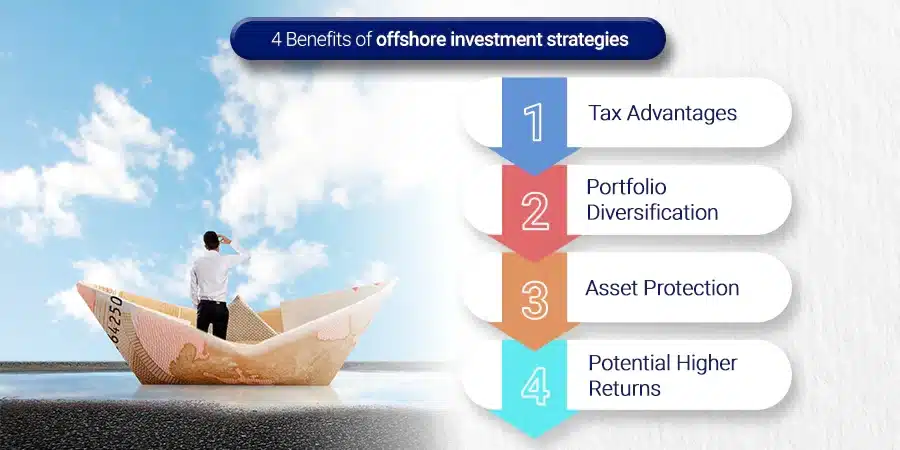Just How Offshore Investment Can Supply Greater Financial Flexibility and Versatility
Just How Offshore Investment Can Supply Greater Financial Flexibility and Versatility
Blog Article
Exactly How Offshore Investment Works: A Step-by-Step Break Down for Capitalists
Offshore investment presents a structured path for investors seeking to maximize their economic techniques while leveraging global possibilities. The process starts with the careful selection of a territory that straightens with a financier's goals, adhered to by the establishment of an account with a trustworthy offshore institution.

Comprehending Offshore Investment
Recognizing offshore financial investment includes acknowledging the critical benefits it supplies to people and corporations seeking to maximize their monetary profiles. Offshore investments normally describe assets kept in a foreign jurisdiction, commonly identified by desirable tax programs, regulatory settings, and privacy securities. The key intent behind such investments is to boost capital development, risk, and diversification monitoring.

Financiers can access a wide variety of economic tools with offshore locations, consisting of supplies, bonds, common funds, and realty. These financial investments are frequently structured to abide by local laws while providing flexibility in regards to possession allotment. Furthermore, offshore investment techniques can allow organizations and people to hedge versus residential market volatility and geopolitical threats.
Another key facet of offshore financial investment is the capacity for enhanced personal privacy. Lots of overseas jurisdictions have rigorous discretion regulations, which can safeguard an investor's monetary information from public disclosure. It is essential for investors to stay certified with their home nation's tax obligation policies and coverage demands, as non-compliance can lead to severe penalties. A comprehensive understanding of both the advantages and responsibilities associated with overseas financial investments is crucial for informed decision-making.
Advantages of Offshore Investing
Capitalists usually turn to offshore investing for its many advantages, including tax obligation performance, asset protection, and portfolio diversification. Among the main advantages is the potential for tax optimization. Numerous overseas jurisdictions use beneficial tax obligation routines, permitting capitalists to legally decrease their tax obligation responsibilities and make best use of returns on their financial investments.
In addition, overseas accounts can offer a layer of asset defense. Offshore Investment. By placing assets in politically steady jurisdictions with solid privacy laws, investors can protect their wealth from potential lawful cases, lenders, or economic instability in their home nations. This kind of security is specifically attracting high-net-worth people and entrepreneurs encountering lawsuits dangers
Furthermore, overseas investing assists in profile diversity. Accessing worldwide markets enables capitalists to discover opportunities in different possession classes, consisting of real estate, stocks, and bonds, which may not be available locally. This diversification can decrease overall profile threat and improve possible returns.
Inevitably, the advantages of overseas investing are compelling for those looking for to enhance their monetary strategies. It is vital for capitalists to thoroughly understand the guidelines and ramifications linked with overseas investments to make sure conformity and accomplish their monetary goals.
Choosing the Right Jurisdiction
Choosing the suitable territory for overseas investing is a crucial choice that can substantially affect a financier's monetary method. The ideal territory can provide numerous advantages, including beneficial tax obligation frameworks, property protection regulations, and regulative environments that straighten with a financier's objectives.
When selecting a territory, think Go Here about factors such as the political security and economic health and wellness of the nation, as these aspects can affect financial investment safety and returns. In addition, the legal structure bordering foreign financial investments need to be assessed to guarantee conformity and protection of possessions. Countries known for durable lawful systems and transparency, like Singapore or Switzerland, typically infuse better self-confidence amongst investors.
Furthermore, examine the tax effects of the jurisdiction. Some countries offer attractive tax obligation incentives, while others may enforce rigid reporting demands. Comprehending these subtleties can assist in maximizing tax obligation liabilities.

Actions to Set Up an Offshore Account
Developing an overseas account entails a collection of systematic steps that guarantee conformity and protection. The initial step is selecting a trustworthy offshore banks, which must be accredited and controlled in its jurisdiction. Conduct thorough research study to evaluate the organization's credibility, services supplied, and consumer testimonials.
Next, collect the needed documentation, which usually includes recognition, evidence of address, and information concerning the resource of funds. Different jurisdictions may have differing needs, so it is essential to useful site verify what is required.
As soon as the documentation is prepared, initiate the application process. This may include submitting kinds on the internet or face to face, depending upon the establishment's procedures. Be planned for a due persistance process he said where the bank will certainly confirm your identity and analyze any type of potential threats linked with your account.
After approval, you will get your account information, permitting you to money your offshore account. It is a good idea to maintain clear records of all transactions and conform with tax regulations in your house country. Developing the account correctly sets the foundation for reliable overseas financial investment management in the future.
Handling and Monitoring Your Investments
When an offshore account is effectively set up, the focus shifts to taking care of and checking your investments properly. This essential stage includes a systematic method to ensure your properties line up with your monetary objectives and risk resistance.
Begin by developing a clear investment technique that outlines your purposes, whether they are prime conservation, income generation, or growth. On a regular basis evaluate your portfolio's efficiency versus these benchmarks to analyze whether adjustments are required. Using monetary administration devices and systems can help with real-time tracking of your financial investments, giving understandings into market fads and asset allowance.
Engaging with your overseas economic advisor is vital. They can supply knowledge and guidance, assisting you browse complex global markets and regulative atmospheres. Set up routine reviews to discuss efficiency, examine market problems, and rectify your technique as needed.
In addition, remain educated about geopolitical growths and financial signs that might influence your investments. This proactive approach allows you to react promptly to changing circumstances, guaranteeing your offshore profile continues to be durable and straightened with your investment goals. Eventually, thorough monitoring and ongoing surveillance are vital for optimizing the benefits of your overseas investment approach.
Final Thought
Finally, offshore investment provides a critical opportunity for portfolio diversification and risk management. By picking a proper jurisdiction and involving with trustworthy monetary establishments, financiers can navigate the complexities of worldwide markets effectively. The systematic approach detailed makes certain that financiers are well-appointed to optimize returns while adhering to lawful frameworks. Proceeded monitoring and partnership with monetary advisors continue to be crucial for maintaining an active investment strategy in an ever-evolving global landscape.
Offshore investment provides a structured path for investors looking for to enhance their monetary techniques while leveraging worldwide possibilities.Comprehending overseas financial investment includes recognizing the calculated advantages it uses to companies and people seeking to optimize their economic portfolios. Offshore investments commonly refer to properties held in an international jurisdiction, usually defined by beneficial tax programs, regulative environments, and privacy defenses. Additionally, overseas financial investment approaches can allow organizations and people to hedge versus residential market volatility and geopolitical risks.

Report this page